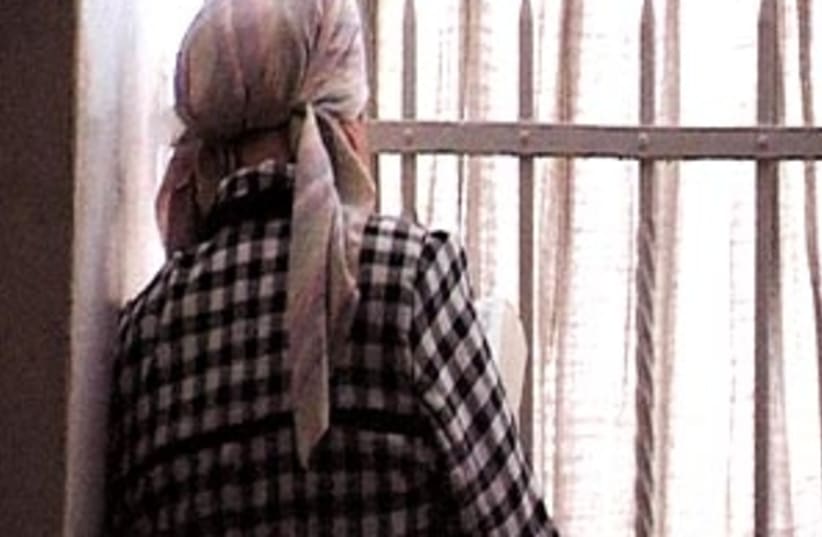Sponsored by the National Foundation for Jewish Culture (which provided Alexander with the funds to complete her first film) together with the Los Angeles Jewish Federation, she is in town briefly to promote her first feature documentary - Keep Not Silent - before flying off to San Francisco where the movie will open the San Francisco Jewish Film Festival.
Completed in 2004, it's a documentary that has won a slew of local and international awards, including the Israeli Oscar for Best Documentary in 2004. And like any good piece of work, it's a film that has set tongues wagging.
Keep Not Silent follows three Orthodox Jerusalem women. What makes them unique is that all three are lesbians, members of a support group called "Ortho-Dykes" and all are struggling to find a way to come to terms with their situation and still remain both part of and accepted by their Orthodox community.
It's a poignant and moving film, with each of the women willing to confront the painful duality of their situation, not only with their families and rabbis, but ultimately with Alexander, and of course, the viewing audience.
What makes Alexander's film so powerful is that she was able to gain these women's trust over a period of four years. She also gained the trust of the husband of one of the women and he speaks openly about how he allows his wife to meet with her lover several times a week.
From a purely cinematic viewpoint, Alexander was faced with a daunting task - finding a way to have those in the documentary connect with the film-going public but knowing that at all times she could never reveal their faces, for fear of the backlash that might accompany them from their tight-knit community.
But Alexander never gave up. She says she doesn't regret for a moment the four years it took to complete the film. "This was so difficult to make cinematically," she says. "But I didn't want to quit. I really wanted to stick with this film because it's about Jews who despite everything stay in the religious world."
There are other women in similar situations, Alexander continues, that ultimately become secular. "But these are women who want to have a place in their own world and who are fighting to do so."
Whatever Alexander's reasonings, the film has clearly struck a chord with people around the world. Keep Not Silent has not only won the DocAviv International Documentary Film Festival Award, but the Audience Award at the Berlin Jewish Film Festival, the Freedom Award at the Outfest Los Angeles Gay and Lesbian Film Festival, and has received critical acclaim in the United Kingdom (where it's been nominated for a Grierson Award for Best International Television Documentary, at various festivals throughout the United States, as well as Korea, Australia and Canada to name a few.
Alexander says she can't really pinpoint what it is that's made her film so successful, but speculates that it may have something to do with "the amount of love that went into this film and the fact that because of the obstacles I was facing, I was forced to be very creative cinematically."
Some of the techniques Alexander is referring to are the use of a patterned curtain to silhouette the face of one of the women's husbands, showing only the hands or the hair or backs of another woman. And one of the women (Miriam) is filmed only via an Internet hookup on a computer screen.
It's only later that Alexander informs me that Miriam actually "came out" at the San Francisco Jewish Film Festival. As a result of working closely with Alexander, Miriam finally decided it was time to show her face literally. Alexander states it was a very positive experience.
In fact, so concerned was Alexander about members of the Orthodox Jerusalem community becoming aware of who these women were in their midst, she has turned down offers to have the film screened on Channel 1 or Channel 2. To date, only the Cable Channel 8 has screened the show (a record 4 times now). Says Alexander, "It's unlikely those in the community would have access to this channel."
Alexander finds it amusing that people are surprised to discover that she is neither Orthodox nor lesbian. For her, the seed was planted for the film back in 1996, when a woman's body remained unclaimed following a suicide bus bombing in the capital. It turned out, the woman was from an Orthodox family in Mea Shearim whose family had excommunicated her after discovering she was a lesbian.
Horrified by the story, Alexander reveals, "I sent out emails, put up notices, to find people who would talk to me about this woman and her life." From there, Alexander connected with Ortho-Dykes and eventually found three subjects willing to be filmed.
Alexander cites Avi Mugrabi and Anat Zuria as just two of the local filmmakers she admires. "I really appreciate films that have unique concepts," she says. "And my film raises deep questions, and not just questions about religious issues."
Not one to rest on her laurels, Alexander has at least four other irons in the fire. Her next film focuses on domestic violence and exploring group therapy for both the man and the woman. She's also off to Tibet shortly to work on a film about the search for an heir to the Dalai Llama.
Bur first she's off to Switzerland to present Keep Not Silent at yet another festival. Alexander says she hopes audiences come away from her film with a lot of questions.
"I don't care about the answers," she states emphatically. " My goal is to try and raise questions because once you ask yourself questions, you realize that you don't have all the answers."
By following three Orthodox Jewish lesbians, Ilil Alexander's documentary reveals the painful dual lives of an inconspicuous 'Ortho-dyke' community
| More about: | Dalai Lama, Tel Aviv University, United Kingdom, United States |
